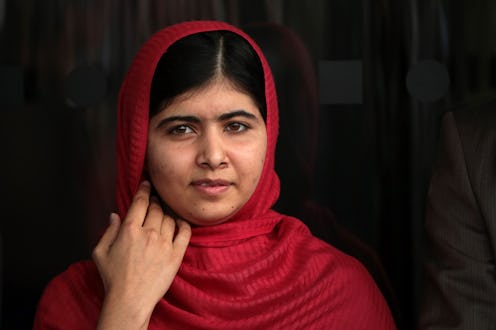News
What Malala Revealed To Diane Sawyer
Malala Yousafzai, the 16-year-old activist who drew worldwide attention last year after the Taliban attempted to kill her, sat down for an interview with ABC's Diane Sawyer last night. Yousafzai recalled when the Taliban came to her town in the Swat Valley, burned down girls' schools, threw acid at the students, and flogged women publicly in the streets.
"What was the moment you were most afraid, that you had the most fear?" Sawyer asked Yousafzai.
"I was feeling fear all the time," she said. "At night, when I was to sleep, I was thinking, 'Shall I put a knife under my pillow?'"
Soon after the Taliban came, Yousafzai emerged as a vocal activist for her right to education. At 11 years-old, Yousafzai received nationwide attention in Pakistani media for denouncing the Taliban. Later, she also blogged about life under Taliban rule for the BBC Urdu service, dictating her entries to a Bureau journalist over the phone. He published them under her pen name, 'Gul Makai,' the name of character from a Pashtun folk story. The New York Times filmed a documentary about her.
On camera, in one of Yousafzai's first interviews during that time, she spoke with her face uncovered: "We must have the confidence to say that this thing is going on. We must raise our voice."
But the exposure caught up with her: One year ago this week, a Taliban gunman boarded her schoolbus. She had prepared for this moment. She thought she even knew what she would say: "I even want an education for your daughter."
He shot her three times.
After initial treatment at a military hospital, Yousafzai was transported to Birmingham for further recuperation.
"I think life is always dangerous," she told Diane Sawyer. "I think some people get afraid of it. They don't go forward. Some people, if they want to achieve their goal, they have to go."
And Yousafzai's gone to meet her goals. She's appeared at the UN, at conferences on human rights, and on television to spread her message of the right to education.
"They cannot stop me, Yousafzai said. "I will get my education, whether it is in my school, school or any place."
But until that time, the Taliban remains — and girls in Pakistan, the Middle East, and numerous other parts of the world still lack access to education.
"We are starving for education," Yousafzai said. "For us, it's like a precious gift, a diamond."
Her book, I Am Malala , is out today.
